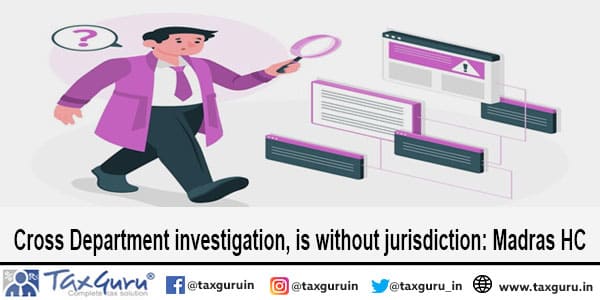Introduction: The recent judgment by the Madras High Court in the case of Tvl. Vardhan Infrastructure and others vs The Special Secretary, Head of the GST Council Secretariat has significant ramifications for cross-department investigations under GST laws in India.
In case of Tvl.Vardhan Infraastructre and others vs The Special Secretary, Head of the GST Council Secretariat, Madras HC held that the proceedings initiated by the respondents so far against the respective petitioners by the Authorities other than the Authority to whom they have been assigned to are to be held as without jurisdiction.
This is very milestone decision from High Court and will have impact on PAN India Level.
Fact of the Case:- Some of the petitioners who have been assigned to the State Authorities. Whereas Proceedings have been initiated by the Central Authorities. Also In some other cases the petitioners who have been assigned to the Central Authorities. Proceedings have been initiated by the State Authorities.
The dispute in these Writ Petitions have arisen on account of the fact that the respective petitioners who have been assigned either to the State Authorities or to the Central Authorities for administrative purposes under the provisions of the respective GST Enactments namely, the Central Goods and Services Tax Act, 2017 , TNGST Act, 2017 and IGST Act, 2017 are/were being subjected proceedings by their counterpart.
Court Finding and conclusion:
In the 9th GST Council meeting held on 16.01.2017, a decision was taken regarding cross-empowerment to ensure a single interface with authorities for the future GST Laws. However, it only the Model GST Laws were in circulation. It was not even in the form of Bills.
With effect from 01.07.2018 vide Circular No.1/2017-GST (Council) dated 20.09.2017. Circular No.1/2017-GST (Council) dated 20.09.2017 was issued for a division of taxpayer base between the Centre and States to ensure a Single Interface under GST Enactments between Tax Officers and Central Tax Officers under CGST/IGST and SGST Acts of 2017
The GST Council in its 22nd Meeting held on 06.10.2017 addressed the concern arising out of the gap between the issuance of Notifications under various GST Enactments of 2017 and IGST Act, 2017. The provisions of the respective GST Enactments contemplates power of the Central Government and the State Government to issue notifications on the recommendations of the GST Councils to empower the Officers of the State Tax Officer or Union Territory Officer to issue Notifications under Section 6 of the CGST Act, 2017 the Central Tax Officers to be the “proper officer” under the respective GST Enactments.
In line with the decision of the 22nd GST Council Meeting held on 06.10.2017, a separate Model Notification was also circulated for the purpose of Section 6 of the respective GST Enactments for other purpose which would have entitled cross-empowerment for other purpose. However, Model Notifications which was circulated during September, 2017 immediately after the GST Enactments came into force with effect from 01.07.2017 have not been notified either under the CGST Act, 2017 or under the SGST Act, 2017. 28. Thus, there is no cross-empowerment

The scheme of enactments as mentioned above makes it clear that the assesses whether assigned to the Central Tax Authorities or the State Tax Authorities as the case may be are required to file only one set of Return under Chapter-IX of the respective GST Enactments of 2017 r/w Chapter-VIII of the respective GST Rules. The returns that are contemplated under Chapter-IX of the respective GST Enactments and Chapter-VIII of the respective GST Rules are parimateria with each other. 33. The returns to be filed by the Assessee’s under the respective GST Enactments are same. They capture all the details under the respective GST Enactments applicable to an assessee.
Section 6(1) of the respective GST Enactments empowers Government to issue notification on the recommendation of GST Council for cross-empowerment. However, no notification has been issued except under Section 6(1) of the respective GST Enactments for the purpose of refund although officers from the Central GST and State GST are proper officers under the respective GST Enactments.
No notifications have been issued for cross-empowerment with advise of GST Council, except for the purpose of refund of tax under Chapter-XI of the respective GST Enactments r/w Chapter X of the respective GST Rules, impugned proceedings are to be held without jurisdiction.
If an assessee has been assigned administratively with the Central Authorities, pursuant to the decision taken by the GST Council as notified by Circular No.01/2017 bearing Reference F.No.166/Cross Empowerment/GSTC/2017 dated 20.09.2017, the State Authorities have no jurisdiction to interfere with the assessment proceedings in absence of a corresponding Notification under Section 6 of the respective GST Enactments.
If an assessee has been assigned to the State Authorities, pursuant to the decision taken by the GST Council as notified by Circular No.01/2017 bearing Reference F.No.166/Cross Empowerment/GSTC/2017 dated 20.09.2017, the officers of the Central GST cannot interfere although they may have such intelligence regarding the alleged violation of the Acts and Rules by an assessee.
Therefore, the proceedings initiated by the respondents so far against the respective petitioners by the Authorities other than the Authority to whom they have been assigned to are to be held as without jurisdiction
Conclusion: In conclusion, the Madras High Court’s ruling in Tvl. Vardhan Infrastructure case clarifies the jurisdictional landscape of cross-department investigations under GST laws. The decision underscores the necessity of formal notifications for cross-empowerment to ensure seamless enforcement and avoid jurisdictional conflicts. This landmark judgment is poised to have a significant impact on GST enforcement practices across India, providing clarity and coherence in administrative proceedings.





